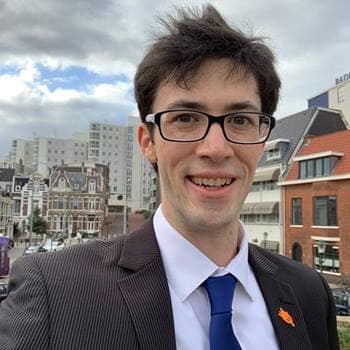New Data Science Tool Boosts First-Year Student Success

When Data Science graduate student Alex Hall heard that the educational support specialist in Embry-Riddle’s College of Arts and Sciences (COAS) was manually downloading data in order to identify students who were struggling during the pandemic, Hall knew he could help.
“I’m always interested in improving and automating processes, as it brings me a lot of personal satisfaction,” he said. “I recognized that we could build a system that automates the manual work so the support specialist can focus on student outreach.”
Partnering with Associate Director of Academic Advancement Dr. Hajara Mahmood, COAS Educational Support Specialist Donna Ferrell and Embry-Riddle's Business Intelligence IT team, Hall helped create an automated process to move data from the university’s Canvas learning management system and other sources to a database, where it could then be displayed with a dashboard tool. Using the dashboard to view student data, the Educational Support Specialist and other university employees were able to reach out to first-year students who were struggling in foundational STEM courses, which often form the basis for further studies.

Data Science graduate student Alex Hall (Photo: Alex Hall)
Alex’s project is an excellent example of data science applied to the education domain,” said Dr. Jayathi Raghavan, chair and professor of the Department of Mathematics. “Analyzing several semesters’ worth of student data gathered from Canvas and ERNIE Central may allow us to develop a model to predict the students who may need additional tutoring, mentoring or guidance.”
Raghavan said she encourages Data Science students to do projects in disciplines that interest them, and undergraduate students are required to complete a minor that aligns with their interests.
“Data pervades every field of study today,” said Raghavan. “Knowledge of how to extract, clean and analyze the data pertaining to the respective domain in order to gain insight and make meaningful predictions is important in any domain. Not only does one need an understanding of the technical aspects of the data science and analysis, but also knowledge in the domain area as well.”
Raghavan said that a student interested in the healthcare industry, for example, could choose the Human Factors track, adding that “the core courses provide the data science foundation, enabling the students to apply these principles” in any industry, she said.
“No matter the discipline, it is all about how and what can we learn from what we know today to improve the future, whether it be better healthcare, better airline routing or improved voice recognition or facial recognition,” she said. “The idea is to make predictions based on the analysis of the current data. As we gather more and more data, we improve and refine the prediction for better accuracy.”
So far, Hall’s project has helped in the mission to reach out to struggling first-year students. Final exam scores improved significantly, and the proportion of students who received failing grades was dramatically reduced.
Dr. Karen Gaines, dean of the College of Arts and Sciences, said the rate of students receiving D’s, F’s or withdrawing from the courses was reduced by half.
“We could not have done it without the dashboard, which empowered the faculty with real-time data to help the students,” Gaines said. “Specifically, the dashboard showed the faculty who was the most vulnerable, based on current and past performance in other courses and coupled with information of what specific course items the student was having trouble with.”
Hall, whose results will be published by the Consortium for Student Retention Data Exchange, said he is optimistic about the project and others like it.
“Data science is a powerful tool,” said Hall, who is already working as a data engineer at geo-intelligence company Space-Eyes and hopes to work at Lockheed Martin after graduation. “Its application will dramatically improve the quality of education that future generations of students receive.”

 Michaela Jarvis
Michaela Jarvis